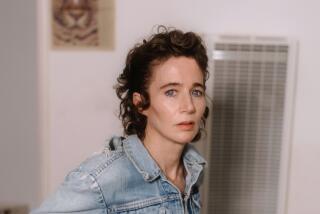Book Review : A Coming-of-Age Theme Overpowered by Aroma
- Share via
Renifleur’s Daughter by Candida Fraze (Henry Holt: $16.95)
This is apparently the year of the olfactory novel, a genre virtually unexplored until the appearance of Patrick Suskind’s widely acclaimed “Perfume.” Though two books about people with an extraordinary sense of smell hardly constitute a trend, they do represent the debut of a theme. In comparison to “Perfume,” with its broad sweeps of history and portentous symbolism, “Renifleur’s Daughter” is a relatively modest effort--a splash of eau de cologne-- despite the insistent sexual undertones and relentless Freudian allusions.
Like the protagonist in the German novel, the narrator’s father is remarkably sensitive to aromas. He too is obsessed with the desire to find and distill the true essence of passion; the ultimate perfume. Renifleur is not his name, but the clinical definition of “one who is sexually aroused or gratified by odors.” He works as a consultant to scent manufacturers, traveling all over the world to test, sniff and advise his employers. On one of these excursions, his chartered plane crashes in the Alps, leaving the orphaned Mona to tell the story of how her father’s highly specialized profession affected every aspect of her life as well as the lives of her elder sister, Prima, her younger brother, Piero, and their delicate and beautiful mother who accompanied her husband on the fatal flight.
Daily Routine
After their parents’ death, the three children remain in the large Washington house owned by their grandfather, chairman of the anatomy department at Georgetown University Medical School. Outwardly, their routine seems unchanged; inwardly, they’re liberated. Not only had Papa’s hyper-reactive nose restricted their diet, their amusements and their associations, but the exaggerated sensuality that accompanies so acute a sense of smell had made Mona especially uncomfortable. “My life was easier without them. . . . I didn’t have to make my face quiet and blank when I really felt like shouting, ‘Stop acting that way, stop giving each other looks all the time in front of my friends, stop going upstairs, as if none of us knew what you did up there.’ ” Unlike other Georgetown fathers, Mr. Emory returned home each day for lunch, after which he’d lead his beautiful wife upstairs with an off-hand “You need a nap,” a phrase nicely calculated to mortify an adolescent child.
After their deaths and her older sister’s departure for boarding school, Mona spends her free time in her grandfather’s anatomy lab, honing an already precocious talent for drawing by illustrating his experiments. Even then, her renderings of the human body are distinguished by a precise, explicit perfection of detail beyond mere realism. Prima and Piero also escape into scientific careers: Prima as an academic, Piero to medical school. To all surviving Emorys, the laboratory is a retreat from passion, a refuge from excessive emotion.
Erotica Volumes
While she’s still a student in Toronto, Mona’s work attracts the attention of a pornographer who persuades her to free-lance for his elegant and expensive volumes of erotica. Though she becomes his 6lover, her brief fling with unbridled sensuality is only an aberrant interlude. As soon as she returns to Washington, she becomes her grandfather’s full-fledged collaborator on his magnus opus and embarks upon a life dedicated to hard work and her unique form of art. “I showed structure without destroying form. It was a balancing act, and I was good at it.”
Her first love, Matt, is succeeded by a more mature romance with Charles Sylvester, an older and far more sophisticated man who returns from Europe at just the right time to help Mona complete her arduous voyage of self-discovery. As might be expected in a novel ostensibly written by the daughter of a renifleur, the book is saturated, permeated and suffused with scent at the expense of other imagery.
Instead of visualizing, the reader inhales, an exercise that works better with setting and character, than with plot or motivation. Ultimately, the excessive emphasis upon smell becomes confining and restrictive, offering only a minor, eccentric variation on the conventional coming-of-age theme.
More to Read
Sign up for our Book Club newsletter
Get the latest news, events and more from the Los Angeles Times Book Club, and help us get L.A. reading and talking.
You may occasionally receive promotional content from the Los Angeles Times.







